新概念英语第二册 Lesson 49 The end of dream 讲义
文档属性
| 名称 | 新概念英语第二册 Lesson 49 The end of dream 讲义 | 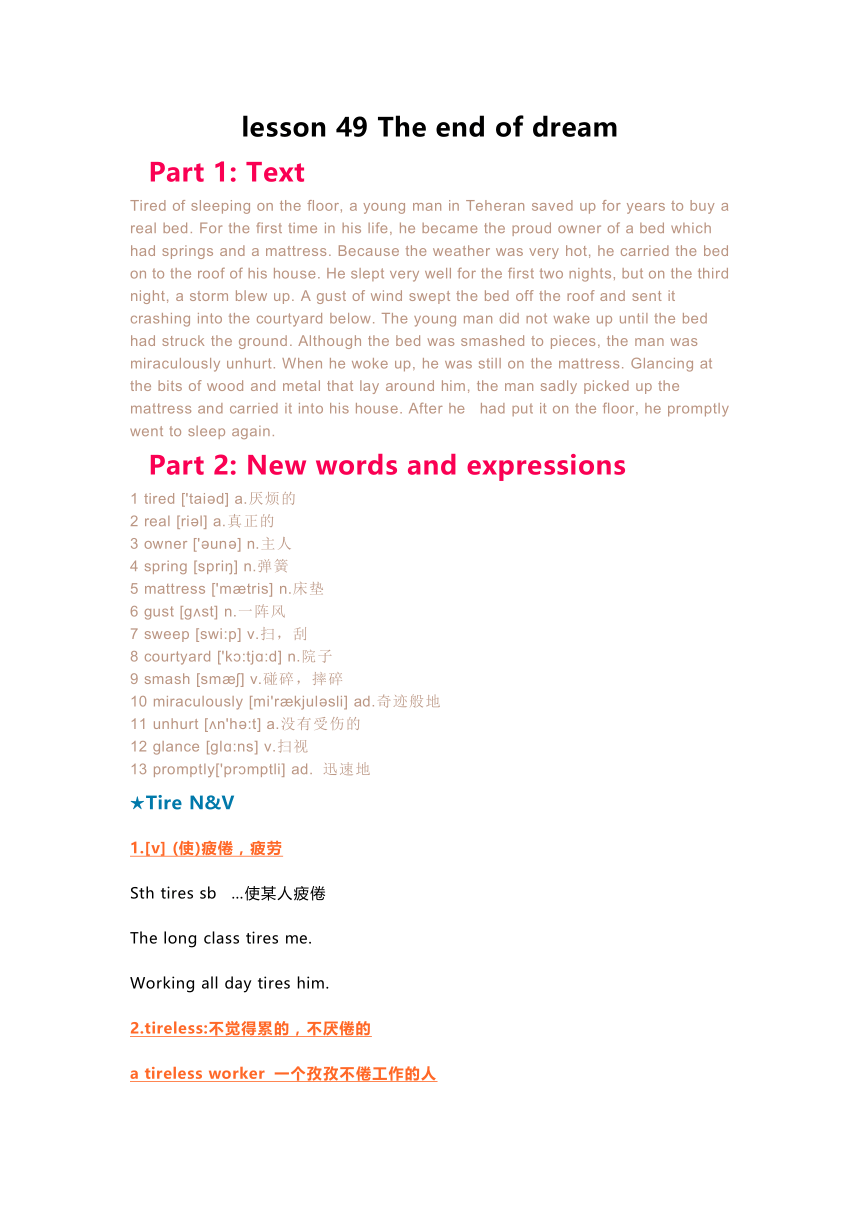 | |
| 格式 | docx | ||
| 文件大小 | 31.9KB | ||
| 资源类型 | 教案 | ||
| 版本资源 | 新概念英语 | ||
| 科目 | 英语 | ||
| 更新时间 | 2023-09-24 22:24:39 | ||
图片预览

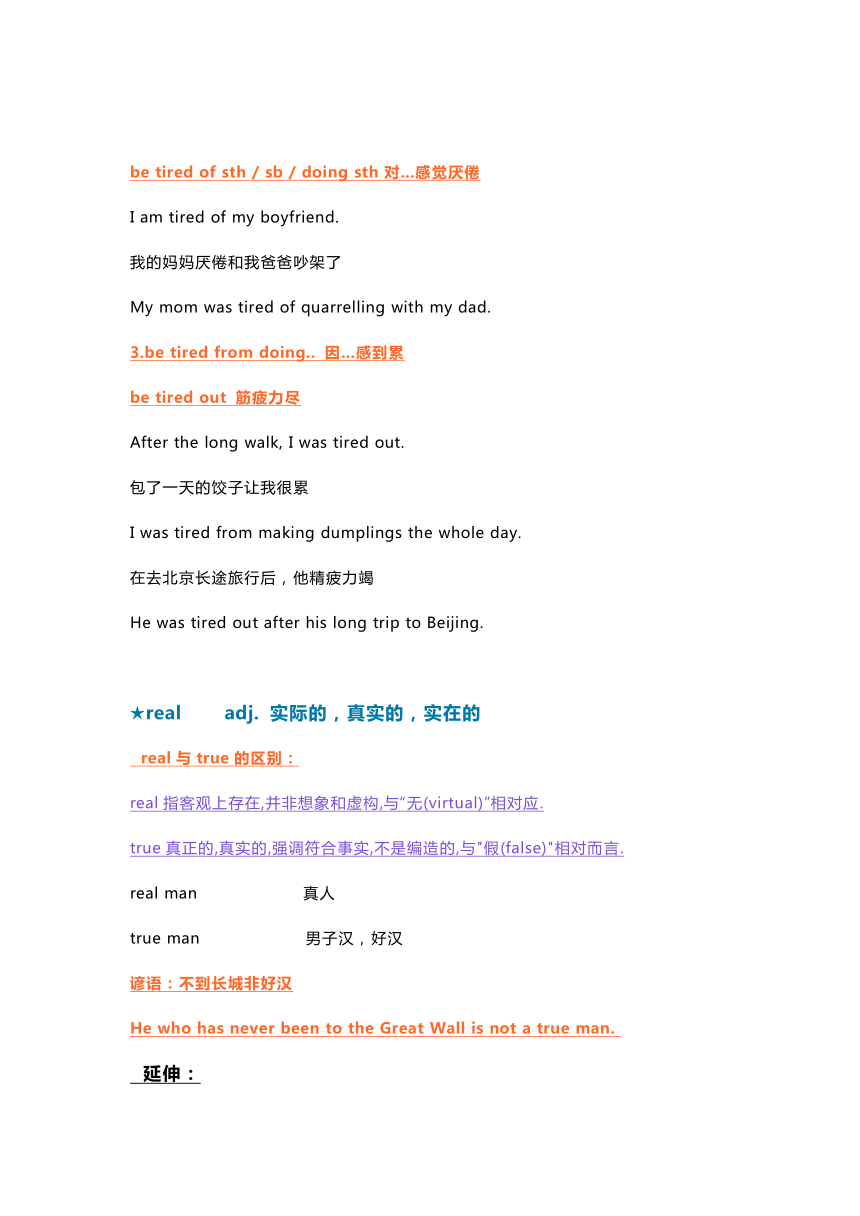
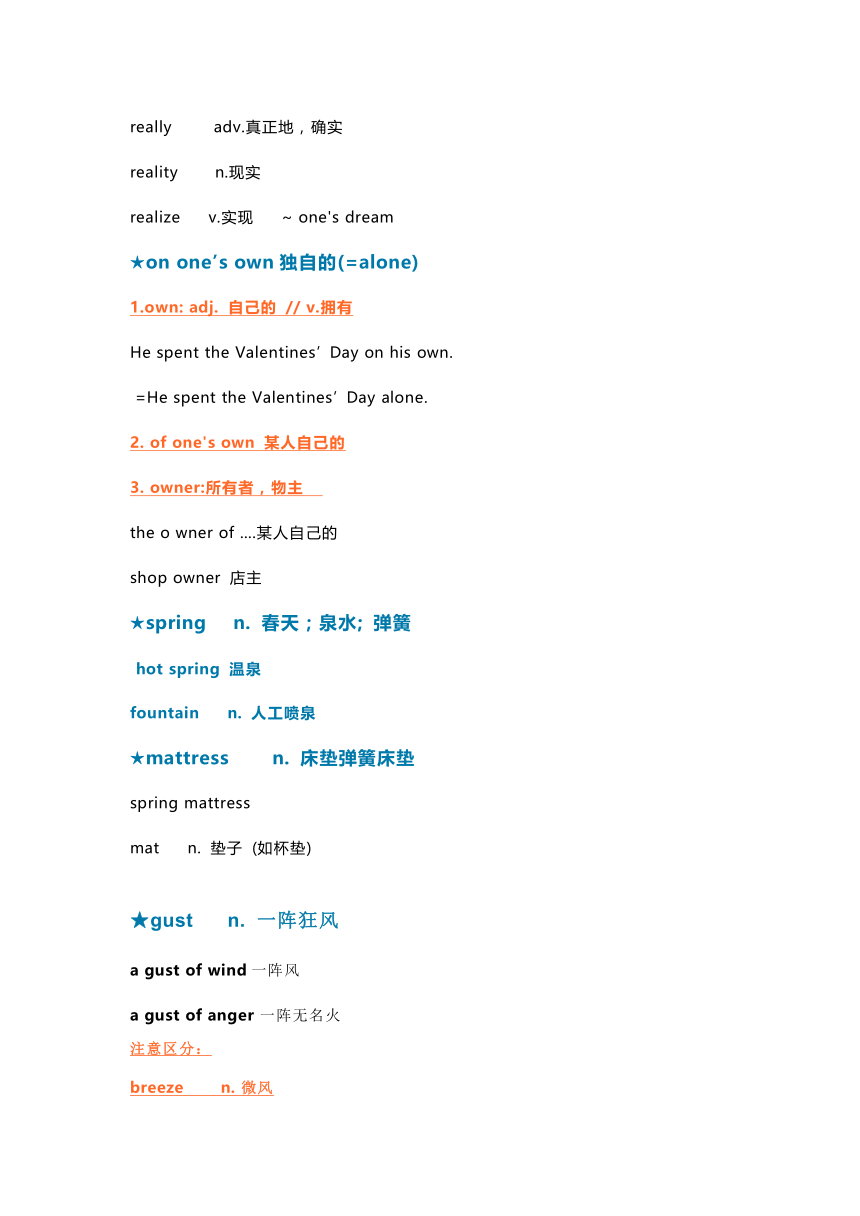
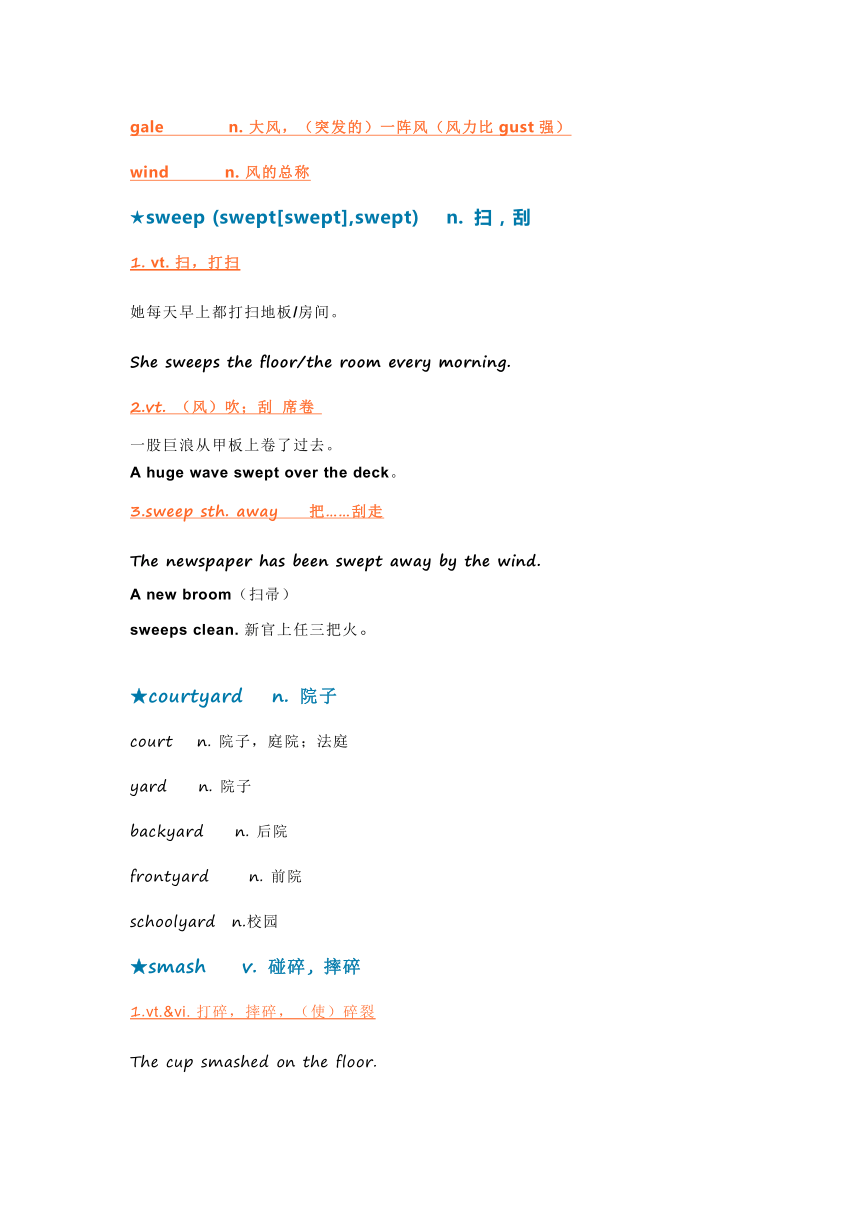
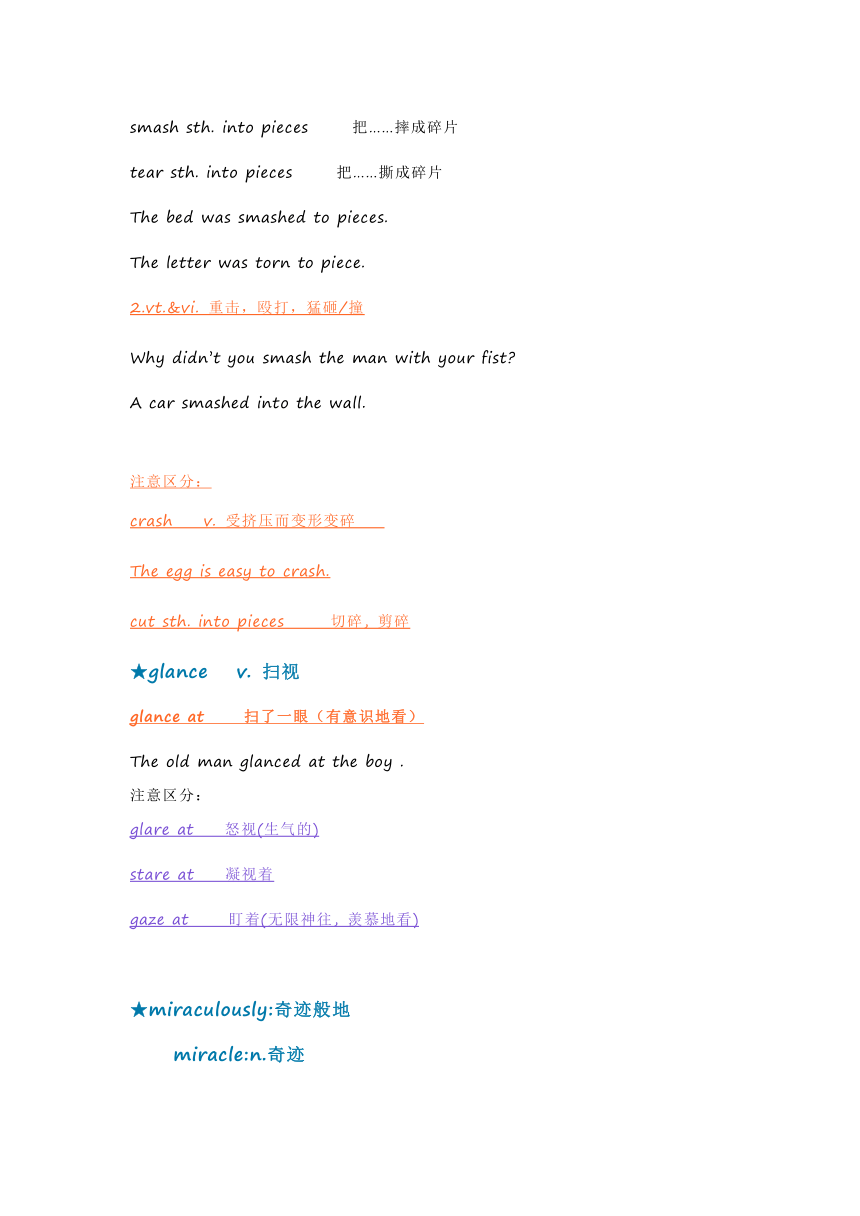
文档简介
lesson 49 The end of dream
Part 1: Text
Tired of sleeping on the floor, a young man in Teheran saved up for years to buy a real bed. For the first time in his life, he became the proud owner of a bed which had springs and a mattress. Because the weather was very hot, he carried the bed on to the roof of his house. He slept very well for the first two nights, but on the third night, a storm blew up. A gust of wind swept the bed off the roof and sent it crashing into the courtyard below. The young man did not wake up until the bed had struck the ground. Although the bed was smashed to pieces, the man was miraculously unhurt. When he woke up, he was still on the mattress. Glancing at the bits of wood and metal that lay around him, the man sadly picked up the mattress and carried it into his house. After he had put it on the floor, he promptly went to sleep again.
Part 2: New words and expressions
1 tired ['tai d] a.厌烦的
2 real [ri l] a.真正的
3 owner [' un ] n.主人
4 spring [spri ] n.弹簧
5 mattress ['m tris] n.床垫
6 gust [g st] n.一阵风
7 sweep [swi:p] v.扫,刮
8 courtyard ['k :tjɑ:d] n.院子
9 smash [sm ] v.碰碎,摔碎
10 miraculously [mi'r kjul sli] ad.奇迹般地
11 unhurt [ n'h :t] a.没有受伤的
12 glance [glɑ:ns] v.扫视
13 promptly['pr mptli] ad. 迅速地
★Tire N&V
1.[v] (使)疲倦,疲劳
Sth tires sb …使某人疲倦
The long class tires me.
Working all day tires him.
2.tireless:不觉得累的,不厌倦的
a tireless worker 一个孜孜不倦工作的人
be tired of sth / sb / doing sth 对...感觉厌倦
I am tired of my boyfriend.
我的妈妈厌倦和我爸爸吵架了
My mom was tired of quarrelling with my dad.
3.be tired from doing.. 因...感到累
be tired out 筋疲力尽
After the long walk, I was tired out.
包了一天的饺子让我很累
I was tired from making dumplings the whole day.
在去北京长途旅行后,他精疲力竭
He was tired out after his long trip to Beijing.
★real adj. 实际的,真实的,实在的
real与true的区别:
real指客观上存在,并非想象和虚构,与“无(virtual)”相对应.
true真正的,真实的,强调符合事实,不是编造的,与"假(false)"相对而言.
real man 真人
true man 男子汉,好汉
谚语:不到长城非好汉
He who has never been to the Great Wall is not a true man.
延伸:
really adv.真正地,确实
reality n.现实
realize v.实现 ~ one's dream
★on one’s own独自的(=alone)
1.own: adj. 自己的 // v.拥有
He spent the Valentines’ Day on his own.
=He spent the Valentines’ Day alone.
2. of one's own 某人自己的
3. owner:所有者,物主
the o wner of ....某人自己的
shop owner 店主
★spring n. 春天;泉水; 弹簧
hot spring 温泉
fountain n. 人工喷泉
★mattress n. 床垫弹簧床垫
spring mattress
mat n. 垫子 (如杯垫)
★gust n. 一阵狂风
a gust of wind一阵风
a gust of anger 一阵无名火
注意区分:
breeze n. 微风
gale n. 大风,(突发的)一阵风(风力比gust强)
wind n. 风的总称
★sweep (swept[swept],swept) n. 扫,刮
1. vt. 扫,打扫
她每天早上都打扫地板/房间。
She sweeps the floor/the room every morning.
2.vt. (风)吹;刮 席卷
一股巨浪从甲板上卷了过去。
A huge wave swept over the deck。
3.sweep sth. away 把……刮走
The newspaper has been swept away by the wind.
A new broom(扫帚)
sweeps clean. 新官上任三把火。
★courtyard n. 院子
court n. 院子,庭院;法庭
yard n. 院子
backyard n. 后院
frontyard n. 前院
schoolyard n.校园
★smash v. 碰碎, 摔碎
1.vt.&vi. 打碎,摔碎,(使)碎裂
The cup smashed on the floor.
smash sth. into pieces 把……摔成碎片
tear sth. into pieces 把……撕成碎片
The bed was smashed to pieces.
The letter was torn to piece.
2.vt.&vi. 重击,殴打,猛砸/撞
Why didn’t you smash the man with your fist
A car smashed into the wall.
注意区分:
crash v. 受挤压而变形变碎
The egg is easy to crash.
cut sth. into pieces 切碎, 剪碎
★glance v. 扫视
glance at 扫了一眼(有意识地看)
The old man glanced at the boy .
注意区分:
glare at 怒视(生气的)
stare at 凝视着
gaze at 盯着(无限神往, 羡慕地看)
★miraculously:奇迹般地
miracle:n.奇迹
★hurt V. (hurt hurt hurt )
1) v. 伤
Have you hurt yourself
2)v. 伤害感情 (尤指思想、心灵)
You hurt my heart.
hurt one`s self-respect 伤害某人的自尊
3)adj. 受伤的 She is hurt. She is unhurt.
I feel hurt . 我感到受了伤害.
badly hurt 严重受伤的
★promptly adv. 迅速地
promptly=at once// immediately//right away
Part 3: Notes on the text
★Tired of sleeping on the floor, a young man in Teheran saved up for years to buy a real bed.
1.be tired of 对...感到厌倦,这里用形容词短语直接做原因状语,相当于原因状语从句as he was tired of...sleeping为动名词,作介词of的宾语。
2.save up 攒钱,储蓄
我朋友想一两年后买房,所以他正尽力攒钱
My friend wants to get married in one or two years, so he`s trying to save (some money) up.
★For the first time in his life, he became the proud owner of a bed which had springs and a mattress.
1.for the first time in one's life 平生第一次
2.be proud of=take pride in 为...而骄傲
which引导的定语从句用来修饰a bed,是a bed的后置定语
★Because the weather was very hot, he carried the bed on to the roof of his house.
on to(onto) 类似与 in to(into),用于表示动作方向而不用于表示静态的位置,不但有“去”的概念还有把它放到“on”(上面)的概念。onto/on to有时可用on代替,但表示位置的on不可用onto代替:
I put the pen onto/on the table.
The pen is on the table.
(不能用onto/on to)
★He slept very well for the first two nights, but on the third night, a storm blew up.
1.for the first two nights 头两天晚上
I study hard for the first three days.
for the last three nights 最后三天晚上
2.blow up 风越刮越大(程度在加深),(指暴风雨)出现并加剧;刮起
★A gust of wind swept the bed off the roof and sent it crashing into the courtyard below.
1.gust表示“一阵强风,一阵狂风”,既可单独使用,也可用a gust of wind
A gust (of wind) blew my hat off.
She set off even though the wind was blowing in gusts
虽然当时阵阵狂风吹着,她还是出发了
2.send...+doing(宾补)使...怎么样,宾语it和crash是主动关系
crashing into the courtyard below是现在分词短语作宾语的补足语。
3.below 直接放在被修饰词之后作定语
一个句子中不能出现两个动词,如果出现了两个动词,要用and或but等连词来连接
★The young man did not wake up until the bed had struck the ground. Although the bed was smashed to pieces, the man was miraculously unhurt
1.not…until表示“直到……才”,until前面没有not时,与表示一段时间的“持续动词”连用;有not时,常用表示某一时间点的动词(或瞬间动词)连用:我要在这儿呆到星期一。
l will stay here until Monday.
我要到星期一才离开。
I won’t leave until Monday.
2.wake up 醒来
3.although 尽管;though 虽然,意义差不多
4.to pieces 粉碎地,成碎片地
杯子摔得粉碎 The cup was broken to pieces.
★Glancing at the bits of wood and metal that lay around him, the man sadly picked up the mattress and carried it into his house.
glancing为现在分词,引导的短语相当于一个时间状语从句after he glanced at me....,动词的ing形式强调与所修饰的名词之间的主动关系。that引导的关系从句修饰the bits of wood and metal, that在从句中作主语。
bits = pieces
pick up 拿起,拾起
lie和lay的区别
(1)首先来看lay(lay----laid----laid----laying),它的主要意思是“产卵”、“放置”等,比如:
The hen is laying an egg.母鸡在下蛋。
He laid his hands on my shoulder.他把手放在我的肩上。
(2)lie用作不规则动词(lie----lay----lain----lying)时,表示“躺”、“(东西)平放”、“位于”等意,比如:
He felt tired, so he went and lay down for a rest.
他感到疲劳,所以去躺下休息了。
His books lay open on the desk when I went in.
我进去时,发现他的书平摊在书桌上。
(这里的lay是lie的过去式。)
lay强调动作,而lie强调状态。比如我们要描述一个躺在床上的婴儿,如果要强调妈妈把孩子放在床上的动作,就可以说:Mother laid the baby gently on the bed.如果要强调“孩子是躺在床上的”这种状态,就要说:The baby lying on the bed was my little sister.
Part 4: Grammar&Difficult points
复合句的构成方法可以是把简单句连接在一起。但与并列句不同,它的各个组成部分并非同等重要,其中总有一个独立分句(或称“主句”)和一个或一个以上从属分句(或称“从句”),主句往往可以独立存在。复合句可用两种方法构成。一是用连词把从句与主句连接起来;二是用分词结构或不定式,它们构成复合句的一部分,因为它们可以用从句的形式表现出来。依照内容,从句可以分为三类:
1、名词性从句(主语从句;表语从句;宾语从句;同位语从句等)
2、形容词性从句(定语从句)
3、副词性从句(状语从句)
复合句构成方法
1.用连词把主从句连接起来
①在复合句中,从句可以是名词从句(即起名词的作用)。在句子中,它可以作主语、宾语或be等系动词的表语,一般由that引导,有时也用what(疑问词引导的除外)
I know (that) the meeting will be put off.我知道会议将要推迟。(宾语)
That the meeting will be put off is now certain.会议将被推迟现已确定无疑。(主语that不可省略)
②从句可以是形容词性(或定语)从句,关系代词通常有who,whom,that,which和whose。(cf.第28课语法)
③从句可以是副词(或状语)从句
时间状语从句连词有when,after,before,as soon as,until,while,as,since等;
He has been ill since he came back from his holidays.
他自从休假回来就一直病着。
地点状语从句连词有where,everywhere,anywhere等;
With a special train ticket, you can travel anywhere/ everywhere you like in Europe for just over £ 100.
你如持有专票,仅花一百多一点英镑,就可以到欧洲各地旅行。
方式状语从句连词有as或短语in the way (that)等,方式状语从句在动词be,feel,seem,appear等后面也可以由连词as if和as though来引导;
Type this again as/in the way(that) I showed you just now.
按我刚才告诉你的那样把这再打一遍。
It feels as if/ though it's going to rain.
这天气给人的感觉好像是就要下雨了。
原因状语从句由because,as,since等引导;
He went to bed earlier than usual because he was tired.
他因为累了,所以睡觉比平时早。
As you can't go yourself, you'll have to ask Susan go to for you.
既然你自己不能去,那你就请苏珊替你去吧。
条件状语从句可由if,unless,as long as, if only, on condition that及其他连词引导;
让步状语从句连词although,though,even though,even if等引导;
He failed the exam, even though he studied hard.
虽然他学习很努力,他考试还是没及格。
Although he studied hard, he failed the exam.(译文同上)
目的状语从句由so that,in order that等连词引导;
I arrived early so that/ in order that I could get the tickets.
我到得很早,以便能买到票。
结果状语从句由so+形容词+that引导,也可由such (a) +(形容词) + 名词 + that来引导;
She was so angry that she left immediately.
她非常生气,立刻就走了。
There was such a lot of rain that we couldn't go out.
下这么大的雨,我们都出不了门了
比较状语从句结构as +形容词/副词 + as,not so/as … as,形容词/副词的比较级 +than,more…than,less…than等
He is as quick in answering as his sister(is).
他回答得和他妹妹/姐姐一样快。
He is not so/ as quick in answering as his sister(is).
他回答得不如他妹妹/姐姐那样快。
He moves more slowly than his sister(does).
他行动起来比他妹妹/姐姐慢。
2.用分词或不定式,构成复合句的一部分
①用现在分词结构可代替时间从句、原因从句、关系从句等,
I got very angry speaking to them.
和他们谈话时我变得非常生气。(时间)
Feeling tired, I went to bed earlier than usual.
我觉得很累,所以睡得比平时早。(原因)
The train arriving at 8 o'clock is from London.
8点钟到的这趟列车是从伦敦来的。(代替关系从句)
②这种用法仅限于两个动作的主语一致的时候。用它代替时间从句时,分词结构表示的动作
如果发生在前,则分词结构要位于主语前;如果两个动作同时发生,那么分词结构既可以位
于主句前,也可以位于主句后。分词结构位于主句前面时,要用逗号隔开。
Finding the door unlocked, he went into the room.
他发现门没上锁,就走进房间。(有前后)
Working with them, I got very angry.
同他们一起工作时我很生气。(同时)
③过去分词结构常用于比较正式的文体,往往代替被动语态
例如:Damaged in an accident, the car has now been repaired.在一次事故中被撞坏后,那辆车现已修好。
3、不定式结构的复合句
这种结构通常可以代替表示目的或表示条件的状语从句:
To get into university you have to pass a number of examinations.
要进入大学你必须通过一系列考试。
I borrowed some money to get a new car.
为了买辆新车,我借了些钱。
Part 5: Homework
1.背诵lesson 49单词&课文
2.Retell the text
3.练习总结课文
Part 1: Text
Tired of sleeping on the floor, a young man in Teheran saved up for years to buy a real bed. For the first time in his life, he became the proud owner of a bed which had springs and a mattress. Because the weather was very hot, he carried the bed on to the roof of his house. He slept very well for the first two nights, but on the third night, a storm blew up. A gust of wind swept the bed off the roof and sent it crashing into the courtyard below. The young man did not wake up until the bed had struck the ground. Although the bed was smashed to pieces, the man was miraculously unhurt. When he woke up, he was still on the mattress. Glancing at the bits of wood and metal that lay around him, the man sadly picked up the mattress and carried it into his house. After he had put it on the floor, he promptly went to sleep again.
Part 2: New words and expressions
1 tired ['tai d] a.厌烦的
2 real [ri l] a.真正的
3 owner [' un ] n.主人
4 spring [spri ] n.弹簧
5 mattress ['m tris] n.床垫
6 gust [g st] n.一阵风
7 sweep [swi:p] v.扫,刮
8 courtyard ['k :tjɑ:d] n.院子
9 smash [sm ] v.碰碎,摔碎
10 miraculously [mi'r kjul sli] ad.奇迹般地
11 unhurt [ n'h :t] a.没有受伤的
12 glance [glɑ:ns] v.扫视
13 promptly['pr mptli] ad. 迅速地
★Tire N&V
1.[v] (使)疲倦,疲劳
Sth tires sb …使某人疲倦
The long class tires me.
Working all day tires him.
2.tireless:不觉得累的,不厌倦的
a tireless worker 一个孜孜不倦工作的人
be tired of sth / sb / doing sth 对...感觉厌倦
I am tired of my boyfriend.
我的妈妈厌倦和我爸爸吵架了
My mom was tired of quarrelling with my dad.
3.be tired from doing.. 因...感到累
be tired out 筋疲力尽
After the long walk, I was tired out.
包了一天的饺子让我很累
I was tired from making dumplings the whole day.
在去北京长途旅行后,他精疲力竭
He was tired out after his long trip to Beijing.
★real adj. 实际的,真实的,实在的
real与true的区别:
real指客观上存在,并非想象和虚构,与“无(virtual)”相对应.
true真正的,真实的,强调符合事实,不是编造的,与"假(false)"相对而言.
real man 真人
true man 男子汉,好汉
谚语:不到长城非好汉
He who has never been to the Great Wall is not a true man.
延伸:
really adv.真正地,确实
reality n.现实
realize v.实现 ~ one's dream
★on one’s own独自的(=alone)
1.own: adj. 自己的 // v.拥有
He spent the Valentines’ Day on his own.
=He spent the Valentines’ Day alone.
2. of one's own 某人自己的
3. owner:所有者,物主
the o wner of ....某人自己的
shop owner 店主
★spring n. 春天;泉水; 弹簧
hot spring 温泉
fountain n. 人工喷泉
★mattress n. 床垫弹簧床垫
spring mattress
mat n. 垫子 (如杯垫)
★gust n. 一阵狂风
a gust of wind一阵风
a gust of anger 一阵无名火
注意区分:
breeze n. 微风
gale n. 大风,(突发的)一阵风(风力比gust强)
wind n. 风的总称
★sweep (swept[swept],swept) n. 扫,刮
1. vt. 扫,打扫
她每天早上都打扫地板/房间。
She sweeps the floor/the room every morning.
2.vt. (风)吹;刮 席卷
一股巨浪从甲板上卷了过去。
A huge wave swept over the deck。
3.sweep sth. away 把……刮走
The newspaper has been swept away by the wind.
A new broom(扫帚)
sweeps clean. 新官上任三把火。
★courtyard n. 院子
court n. 院子,庭院;法庭
yard n. 院子
backyard n. 后院
frontyard n. 前院
schoolyard n.校园
★smash v. 碰碎, 摔碎
1.vt.&vi. 打碎,摔碎,(使)碎裂
The cup smashed on the floor.
smash sth. into pieces 把……摔成碎片
tear sth. into pieces 把……撕成碎片
The bed was smashed to pieces.
The letter was torn to piece.
2.vt.&vi. 重击,殴打,猛砸/撞
Why didn’t you smash the man with your fist
A car smashed into the wall.
注意区分:
crash v. 受挤压而变形变碎
The egg is easy to crash.
cut sth. into pieces 切碎, 剪碎
★glance v. 扫视
glance at 扫了一眼(有意识地看)
The old man glanced at the boy .
注意区分:
glare at 怒视(生气的)
stare at 凝视着
gaze at 盯着(无限神往, 羡慕地看)
★miraculously:奇迹般地
miracle:n.奇迹
★hurt V. (hurt hurt hurt )
1) v. 伤
Have you hurt yourself
2)v. 伤害感情 (尤指思想、心灵)
You hurt my heart.
hurt one`s self-respect 伤害某人的自尊
3)adj. 受伤的 She is hurt. She is unhurt.
I feel hurt . 我感到受了伤害.
badly hurt 严重受伤的
★promptly adv. 迅速地
promptly=at once// immediately//right away
Part 3: Notes on the text
★Tired of sleeping on the floor, a young man in Teheran saved up for years to buy a real bed.
1.be tired of 对...感到厌倦,这里用形容词短语直接做原因状语,相当于原因状语从句as he was tired of...sleeping为动名词,作介词of的宾语。
2.save up 攒钱,储蓄
我朋友想一两年后买房,所以他正尽力攒钱
My friend wants to get married in one or two years, so he`s trying to save (some money) up.
★For the first time in his life, he became the proud owner of a bed which had springs and a mattress.
1.for the first time in one's life 平生第一次
2.be proud of=take pride in 为...而骄傲
which引导的定语从句用来修饰a bed,是a bed的后置定语
★Because the weather was very hot, he carried the bed on to the roof of his house.
on to(onto) 类似与 in to(into),用于表示动作方向而不用于表示静态的位置,不但有“去”的概念还有把它放到“on”(上面)的概念。onto/on to有时可用on代替,但表示位置的on不可用onto代替:
I put the pen onto/on the table.
The pen is on the table.
(不能用onto/on to)
★He slept very well for the first two nights, but on the third night, a storm blew up.
1.for the first two nights 头两天晚上
I study hard for the first three days.
for the last three nights 最后三天晚上
2.blow up
★A gust of wind swept the bed off the roof and sent it crashing into the courtyard below.
1.gust表示“一阵强风,一阵狂风”,既可单独使用,也可用a gust of wind
A gust (of wind) blew my hat off.
She set off even though the wind was blowing in gusts
虽然当时阵阵狂风吹着,她还是出发了
2.send...+doing(宾补)使...怎么样,宾语it和crash是主动关系
crashing into the courtyard below是现在分词短语作宾语的补足语。
3.below 直接放在被修饰词之后作定语
一个句子中不能出现两个动词,如果出现了两个动词,要用and或but等连词来连接
★The young man did not wake up until the bed had struck the ground. Although the bed was smashed to pieces, the man was miraculously unhurt
1.not…until表示“直到……才”,until前面没有not时,与表示一段时间的“持续动词”连用;有not时,常用表示某一时间点的动词(或瞬间动词)连用:我要在这儿呆到星期一。
l will stay here until Monday.
我要到星期一才离开。
I won’t leave until Monday.
2.wake up 醒来
3.although 尽管;though 虽然,意义差不多
4.to pieces 粉碎地,成碎片地
杯子摔得粉碎 The cup was broken to pieces.
★Glancing at the bits of wood and metal that lay around him, the man sadly picked up the mattress and carried it into his house.
glancing为现在分词,引导的短语相当于一个时间状语从句after he glanced at me....,动词的ing形式强调与所修饰的名词之间的主动关系。that引导的关系从句修饰the bits of wood and metal, that在从句中作主语。
bits = pieces
pick up 拿起,拾起
lie和lay的区别
(1)首先来看lay(lay----laid----laid----laying),它的主要意思是“产卵”、“放置”等,比如:
The hen is laying an egg.母鸡在下蛋。
He laid his hands on my shoulder.他把手放在我的肩上。
(2)lie用作不规则动词(lie----lay----lain----lying)时,表示“躺”、“(东西)平放”、“位于”等意,比如:
He felt tired, so he went and lay down for a rest.
他感到疲劳,所以去躺下休息了。
His books lay open on the desk when I went in.
我进去时,发现他的书平摊在书桌上。
(这里的lay是lie的过去式。)
lay强调动作,而lie强调状态。比如我们要描述一个躺在床上的婴儿,如果要强调妈妈把孩子放在床上的动作,就可以说:Mother laid the baby gently on the bed.如果要强调“孩子是躺在床上的”这种状态,就要说:The baby lying on the bed was my little sister.
Part 4: Grammar&Difficult points
复合句的构成方法可以是把简单句连接在一起。但与并列句不同,它的各个组成部分并非同等重要,其中总有一个独立分句(或称“主句”)和一个或一个以上从属分句(或称“从句”),主句往往可以独立存在。复合句可用两种方法构成。一是用连词把从句与主句连接起来;二是用分词结构或不定式,它们构成复合句的一部分,因为它们可以用从句的形式表现出来。依照内容,从句可以分为三类:
1、名词性从句(主语从句;表语从句;宾语从句;同位语从句等)
2、形容词性从句(定语从句)
3、副词性从句(状语从句)
复合句构成方法
1.用连词把主从句连接起来
①在复合句中,从句可以是名词从句(即起名词的作用)。在句子中,它可以作主语、宾语或be等系动词的表语,一般由that引导,有时也用what(疑问词引导的除外)
I know (that) the meeting will be put off.我知道会议将要推迟。(宾语)
That the meeting will be put off is now certain.会议将被推迟现已确定无疑。(主语that不可省略)
②从句可以是形容词性(或定语)从句,关系代词通常有who,whom,that,which和whose。(cf.第28课语法)
③从句可以是副词(或状语)从句
时间状语从句连词有when,after,before,as soon as,until,while,as,since等;
He has been ill since he came back from his holidays.
他自从休假回来就一直病着。
地点状语从句连词有where,everywhere,anywhere等;
With a special train ticket, you can travel anywhere/ everywhere you like in Europe for just over £ 100.
你如持有专票,仅花一百多一点英镑,就可以到欧洲各地旅行。
方式状语从句连词有as或短语in the way (that)等,方式状语从句在动词be,feel,seem,appear等后面也可以由连词as if和as though来引导;
Type this again as/in the way(that) I showed you just now.
按我刚才告诉你的那样把这再打一遍。
It feels as if/ though it's going to rain.
这天气给人的感觉好像是就要下雨了。
原因状语从句由because,as,since等引导;
He went to bed earlier than usual because he was tired.
他因为累了,所以睡觉比平时早。
As you can't go yourself, you'll have to ask Susan go to for you.
既然你自己不能去,那你就请苏珊替你去吧。
条件状语从句可由if,unless,as long as, if only, on condition that及其他连词引导;
让步状语从句连词although,though,even though,even if等引导;
He failed the exam, even though he studied hard.
虽然他学习很努力,他考试还是没及格。
Although he studied hard, he failed the exam.(译文同上)
目的状语从句由so that,in order that等连词引导;
I arrived early so that/ in order that I could get the tickets.
我到得很早,以便能买到票。
结果状语从句由so+形容词+that引导,也可由such (a) +(形容词) + 名词 + that来引导;
She was so angry that she left immediately.
她非常生气,立刻就走了。
There was such a lot of rain that we couldn't go out.
下这么大的雨,我们都出不了门了
比较状语从句结构as +形容词/副词 + as,not so/as … as,形容词/副词的比较级 +than,more…than,less…than等
He is as quick in answering as his sister(is).
他回答得和他妹妹/姐姐一样快。
He is not so/ as quick in answering as his sister(is).
他回答得不如他妹妹/姐姐那样快。
He moves more slowly than his sister(does).
他行动起来比他妹妹/姐姐慢。
2.用分词或不定式,构成复合句的一部分
①用现在分词结构可代替时间从句、原因从句、关系从句等,
I got very angry speaking to them.
和他们谈话时我变得非常生气。(时间)
Feeling tired, I went to bed earlier than usual.
我觉得很累,所以睡得比平时早。(原因)
The train arriving at 8 o'clock is from London.
8点钟到的这趟列车是从伦敦来的。(代替关系从句)
②这种用法仅限于两个动作的主语一致的时候。用它代替时间从句时,分词结构表示的动作
如果发生在前,则分词结构要位于主语前;如果两个动作同时发生,那么分词结构既可以位
于主句前,也可以位于主句后。分词结构位于主句前面时,要用逗号隔开。
Finding the door unlocked, he went into the room.
他发现门没上锁,就走进房间。(有前后)
Working with them, I got very angry.
同他们一起工作时我很生气。(同时)
③过去分词结构常用于比较正式的文体,往往代替被动语态
例如:Damaged in an accident, the car has now been repaired.在一次事故中被撞坏后,那辆车现已修好。
3、不定式结构的复合句
这种结构通常可以代替表示目的或表示条件的状语从句:
To get into university you have to pass a number of examinations.
要进入大学你必须通过一系列考试。
I borrowed some money to get a new car.
为了买辆新车,我借了些钱。
Part 5: Homework
1.背诵lesson 49单词&课文
2.Retell the text
3.练习总结课文
同课章节目录
